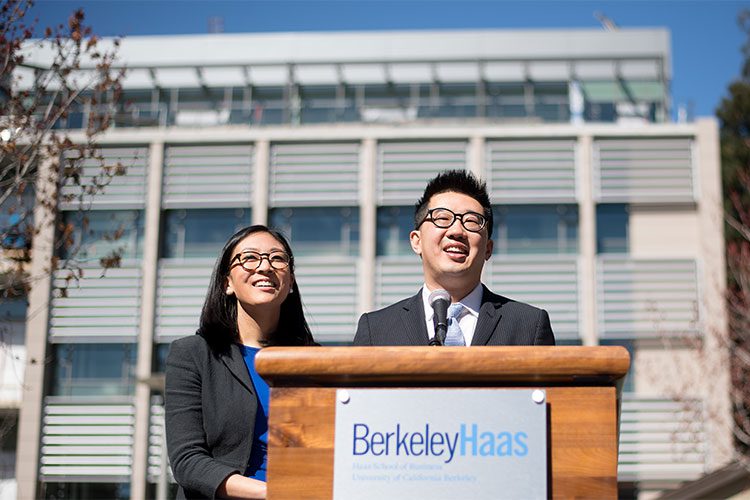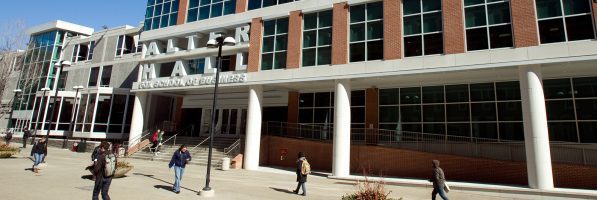What Is Your 2018 MBA Resolution?

For those who aren’t in a post-New Years Eve hibernation, 2018 is here, and that means actually following through on all those promises you hastily made an hour before the year officially began—including your 2018 MBA resolution.
You and every other person in a five mile radius will pack your preferred gym for the next few weeks, dutifully following through on the promises they made themselves. And while the frustration of waiting, waiting, and still waiting for the bench press to open up is inevitably going to sit in, you still have an opportunity to utilize that newfound resolution energy into your MBA degree.
Start of this new year by forming productive habits, achievable goals, and a vision of where you want to end up! #MondayMotivation pic.twitter.com/igYQmNtI3C
— FOX MBA & MS (@FoxMBA) January 2, 2018
But, where do you start?
2018 MBA Resolution Baby Steps
Ordering a multi-thousand dollar exercise bike at the stroke of midnight might have been a more curious impulse, but there are plenty of non-expensive efforts you can make going into a brand new year.
The MIT Sloan School of Management revealed some of its favorite books from the previous year from its distinguished faculty and alumni, including the timely “The Power of Little Ideas: A Low Risk, High Reward Approach to Innovation,” by senior lecturer David Robertson. Which, in itself, can provide a powerful set of ideas to harness that newfound resolution energy.
Looking to up your tech-savvy skillset? Head over to Product Hunt, which provides an impossibly lengthy list of new apps and tools from startup companies that can do almost everything: from learning valuable developer tools to reforming your daily task routine.
Be Wary of Impossible Goals
According to Chicago Booth behavioral science experts, people don’t tend to follow through on grander resolutions.
“‘The problem with big resolutions is that motivation tends to wane over time,’ says Chicago Booth’s Ayelet Fishbach, who studies motivation and decision making. People start out strong, but then reality sets in as they realize it’s easier to set goals than to carry them out. ‘The problem with persisting is that our priorities change in the course of a day, a week, a year,’ says Fishbach. We may wake up in the morning determined to watch what we eat, but by the afternoon, we’re distracted—and start snacking again. Or we may feel determined to invest more time in relationships, but that slips our mind when an important work deadline looms. ‘Successful goal pursuit,’ she says, ‘requires employing strategies that keep us on track as our priorities momentarily shift away.'”
An important part of Fishbach’s research revealed that setting more frequently occurring goals is important to stay on track. This means, “Instead of an annual goal, set a monthly goal. Instead of weekly, make it daily.” When more smaller, reasonable projects are completed, the end goal is more probable. And the more probable a goal is, the greater the motivation, according to Booth marketing professor Oleg Urminsky.
“Proximity to the goal increases motivation. If you’re a rat in a maze, you run faster the closer you get to the end.”
Embrace The Eventual Setback
Anyone who has gone through a diet is more than likely familiar with the concept of a cheat day. While scouring cake one week into your shiny new diet may feel like a small failure, it doesn’t mean it’s time to give up.
According to marketing researchers Marissa A. Sharif and Suzanne B. Shu, authors of the 2017 study “The Benefits of Emergency Reserves: Greater Preference and Persistence for Goals That Have Slack with a Cost” in the Journal of Marketing Research, having a few “mulligan” occurrences is normal and should not deter your overall aim.
“What this suggests is that the perfect goal to set for yourself is probably a tough one but with the explicit allowance for a mulligan or two so you won’t be discouraged by the occasional slip up,” writes Washington Post reporter Katherine L. Milkman.
It’s Time To Go After That MBA
We at MetroMBA may be vocal advocates of an MBA, but numbers speak for themselves. MBA salaries at the top schools in the world hit a record high last year, according to the Financial Times, sitting at an eye-popping $142,000 USD average by the start of 2017—a $7,000 jump from the previous year.
Some of the world’s biggest companies, such as Amazon, are on MBA “hiring sprees” as it rapidly expands its business, indicating the increasingly high demand for graduates.
And if all else fails, just embrace it!
I don’t like New Year’s Resolutions. At all. In fact, I vow to get fatter, more deceitful, spend more frivolously, and enter more toxic relationships. These are my New Year’s Regressions.
— ShinigamE (@WWEBigE) January 1, 2018
Berkeley Haas Opens Fall 2017 With Its Largest Full-Time MBA Class Ever and New Building

Like many top business schools this time of year, the Haas School of Business at the University of California at Berkeley is welcoming its incoming class of MBA students—but at Haas it’s a bigger group than ever before moving into brand-new digs that promise to be among the greenest in the nation.
There are 284 students in the entering class—32 more than last year—which brings what has long been the smallest leading business school more in line with some of its peers. Plans for next year include additional expansion, to a class size of 300. The grand opening of a new academic building—in progress for the past decade—made increasing the class size possible.
“The intimacy of the class is really an important part of what Haas is about,” Dean Richard Lyons acknowledged in a June interview with Clear Admit. But at just 250 students, where the school has hovered for many years, it has been a gross outlier—a mere third the size of Wharton and not even a third the size of Harvard. “Part of the reputation of the school is a function of its scale, and there are times where you are just not at the right reputational scale—you’re too small,” Lyons continued. “It’s a super intimate experience—there’s no question about that—but target companies want to go to a place where there are enough people graduating that they can send a team of recruiters, for example. If you are too small you are below the threshold.”
“We Don’t Want to Lose the Smallness That Makes Us Unique”
Precisely because the intimacy and close-knit nature of Haas is such an integral part of its culture, the administration, including the admissions team, has approached the process of increasing the class size carefully and thoughtfully. “I think people would be surprised by the amount of care that has been taken to consider potential ramifications,” Peter Johnson, assistant dean for the full-time MBA program and admissions, tells Clear Admit, adding that his team considered necessary adjustments of everything from budgets to graduate student instructors, program office staff to career coaches. “We have been very intentional about it because we don’t want to lose the level of smallness that makes us unique. A lot of our students were very concerned that it not change the experience for future students.”
Not only is the incoming class larger than any before it, it is also one of the strongest academically, Johnson says. Average GMAT scores and GPAs have risen over each of the past three years. The average GMAT score this year was 725—a jump from last year’s 717—and the average GPA climbed, too, from 3.64 to 3.71. Application volume also increased this past year, which meant that though the school admitted more students overall to increase class size, the acceptance rate remained constant at 12 percent. HBS, by comparison, generally accepts approximately 11 percent of its applicants.
The incoming class includes 40 percent women, up slightly over last year though still off from the record 43 percent that made up the Class of 2016. International students drawn from 42 different countries make up 39 percent of the class, up from 38 percent last year. Haas leads HBS, Wharton, and Kellogg in this metric, whose incoming classes are all around 35 percent international. Despite concerns that talk of potential immigration and visa reform under the current administration could have a chilling effect on international application volume, applicants from abroad applied in equal numbers this year as last, Johnson notes. U.S. minority students comprise 29 percent of the class, down from 32 percent last year.
In terms of what they did before coming to Haas, members of the Class of 2019 are an incredibly interesting bunch. Among them are a business development manager from Intel who led development of Google’s self-driving cars, an investment banker who ran from San Francisco to New York City over the summer to raise money and awareness of ALS in honor of his grandmother, a Bain consultant who earned four culinary diplomas in her spare time, a student from Nepal who helped senior political leaders and ex-ministers from five major parties negotiate a new constitution, and the founder and CEO of an Indian irrigation company that saves 4 billion liters of water annually while enabling smallholding farmers to produce 10,000 additional tons of food per year.
A quarter of the incoming students worked in consulting prior to Haas, and another 20 percent worked in finance. In terms of undergraduate degrees, 42 percent studied business or economics, 36 percent hold STEM degrees, and 8 percent graduated with degrees in the humanities.
“Top students from around the world with diverse backgrounds and amazing accomplishments continue to choose us for our distinctive culture,” Morgan Bernstein, executive director of full-time MBA admissions, said as part of an article on the Haas website. “No one else has the culture and community that we do.”
Can Chou Hall be the Greenest Academic Building in the U.S.?
The Haas Class of 2019 is the first to inhabit the newly opened Connie & Kevin Chou Hall, an 80,000-square-foot facility that boasts state-of-the-art classroom technology, flexible learning spaces, and features such as efficient heating, cooling, and lighting systems. These, in addition to rainwater cisterns and 24,300 square feet of exterior windows, helped it earn both LEED Platinum certification and WELL certification (an additional accolade applied to buildings that promote the health and well-being of their users).

Kevin Chou and Dr. Connie Che appearing at the Berkeley Haas School of Business last March, after announcing their record-breaking school donation (Noah Berger/2017)
The building bears the name of Kevin Chou, BS ’02, founding CEO of mobile gaming company Kabam, and his wife, Dr. Connie Chen, in recognition of their $25 million donation, the largest to date from an under-40 alum. The remaining funds for the $60 million building also came entirely from alumni and friends of the school.
In addition to LEED Platinum and WELL certification, Chou Hall has been designed to divert 90 percent of waste—including through the mandatory use of reusable mugs and water bottles that can be replenished at filling stations and compost and recycling bins on every floor—which will allow it to achieve zero waste certification by summer 2018. This would make it the first business school in the country to do so.

Early-stage concept art for the Connie & Kevin Chou Hall.
There are no places to dispose of other types of trash—encouraging those who use the building to adopt a “’pack-it-in, pack-it-out’ mentality,” according to Courtney Chandler, senior assistant dean and chief strategy and operations officer. “It might take a little getting used to, but we don’t think it will be hard for the Haas community—we’re all about questioning the status quo and redefining business-as-usual,” Chandler said in a story on the Haas website, referring to two of the school’s defining principles.
The building includes eight tiered classrooms and four flexible classrooms, totaling 858 new classroom seats, as well as 28 student and meeting rooms. This provided the much-needed additional space Haas required to expand its class size. A sixth-floor event space will open next month, and a café offering sustainable, locally sourced food—what else—is slated to begin serving students in early 2018.
This article has been edited and republished with permissions from Clear Admit.
Fox Temple Maintains Top Spot As Country’s Best Online MBA

For the third straight year, the Fox School of Business at Temple University earned top honors as the country’s premiere Online MBA program, according to U.S. News & World Report.
Johns Hopkins Launches Carey Business Fellows Program

According to a recent press release, the Johns Hopkins Carey Business School has established the Carey Business Fellows program in order to provide full tuition and a stipend for top MBA students. The program will be available for students admitted to the fall 2017 class of the full-time Global MBA program. Continue reading…
